
English as our working language: time to switch
While some people still haven't recovered from the shock, for others it is the most natural thing in the world: TU/e plans to adopt English as its working language. For students and employees what practical issues is this switch going to raise? And what solutions do they have in mind? Cursor polled various groups at the university and discussed with the project group the challenges they foresee.
If only it was as easy as flicking a switch, as the illustration depicts, and throughout the university we could all start speaking and writing in English. But things are trickier in practice. In principle, as of 2020 we will all speak English at TU/e whenever necessary - in other words, whenever one of those present cannot speak Dutch. All written communication will also be in English. But all kinds of exceptions to these rules can be imagined. How do you handle documents that are required by law to remain in Dutch? Do you go to the trouble of having them translated? Are job interviews going to be held in Dutch? What should you do if someone adamantly refuses to speak English? Does all the signage have to be in both languages? The project leaders who are working on the implementation are finding themselves faced with these and many other questions. They are busy holding interviews with TU/e services and departments in an effort to establish each one's particular possibilities and problems.
‘English must become the working language at TU/e’. That's the headline we ran last October on the Cursor site. The news prompted parliamentary questions and fuelled the national discussion, which is ongoing even now, about the language to the spoken and written at universities. This involves both the working language and the teaching language. Today it is no longer a question of whether English should become the working language at TU/e, but how the change of direction will take shape in practice.
Awareness raising and behavorial change
Implementation manager Fabienne van der Kooij: “We see this largely as a process of awareness raising and behavioral change. For each part of the organization we aren't going to be prescribing ‘this and that has to change now’. We expect that within the scope of the policy being adopted everyone will take their own responsibility. Nor will we be calling employees and students to account in January 2020; this is an ongoing process. It is important that together we all help create an environment in which people are encouraged to improve their language proficiency - chiefly by using the language.”
In principle no additional central funding will be made available and the services and departments will have to foot the bill when any costs are incurred, says Van der Kooij. “However, our inventory shows that many people are advocating that a professional translation machine be purchased centrally and there's a need for purchasing control where translation agencies are used. We will be looking into that.”
Student charters in both Dutch and English?
The implementation project is three-pronged. With the help of two lawyers at TU/e, secretary to the Executive Board Rianne van Eerd is assessing which documents are officially required to be in Dutch. Van Eerd: “Sometimes that's due to a legal obligation, as it is for the Teaching and Examination Regulations and the management regulations. Similarly, the annual report must be published in Dutch, but that's because that's what they want in The Hague. What's debatable is whether all the student charters also have to be in both Dutch and English. Study and student associations are also struggling with this issue.”
TU/e will be offering these documents not only in Dutch but also in English, tells Van Eerd. Although here too exceptions come to mind. “For example, the risk inventory and risk evaluation documents, which external advisors have been involved in preparing. Perhaps only parts of these would need to be translated.”
Another matter she will be looking into is this: what do you do if a meeting is going to be held in Dutch? “Do you write up the minutes in English? I can imagine that we would have the list of resolutions, for example, translated into English, but not the minutes.”
Courses on offer to students
Leonie Kasje-Adriaanse, team manager at the TU/e Language Center, is examining the courses on offer to students. “Are we doing things right and are we doing the right things? This is something we already review continuously, using, among other things, course evaluations. But this project has provided the impetus for a more extensive review.” By way of sounding board groups, students of a varied range of nationalities will soon be asked to give their opinion of the existing courses of Dutch as a second language and (academic) English and to state their own needs. The team manager: “One of the things that as a university we can improve, I think, is to indicate within the learning trajectories and program outcomes what students should be capable of in the area of (academic) language proficiency.”
In addition, Kasje-Adriaanse is advising another project member, HR advisor Monique van der Hagen-de Boer, about the range of courses on offer to employees.
This HR advisor shows how she has compiled a page-long inventory of questions and comments, gathered from interviews, mostly with the TU/e services. “Generally speaking, the departments – in particular the academic staff - are already further along.” Van der Hagen-de Boer used the UFO profile (the national categorization of jobs used by universities) to draft a guideline stating the level of English that may be expected of employees in a certain position. “It draws on an example produced at Wageningen and is based on the Common European Framework of Reference.” She is following this up by trialing the guideline with the services, and some departments.
“It is difficult to assign similar jobs the same scale. For example, one administrative officer may have a lot of contact with internationals while another has hardly any. Should you expect a similar level in each case?” Another issue: “Some services are keen to be accommodating and agree a development pathway, others see the desired level as a nonnegotiable requirement. So how do you then go about setting the level, and what kind of training should you offer? Policymakers will be chiefly interested in improving their writing skills, and HR staff will want to be able to carry out good job interviews. We may have to offer customized courses.” And those job interviews are also included in the HR advisor's inventory, because in what language should they be held? “And will we switch to recruiting only in English? At the moment it's arbitrary. Another challenge: suppose you find the perfect candidate and their English is mediocre?”
Once the inventory is complete, the project group will establish the broad outlines of the policy and agree it with various consultative bodies.
Considering what is possible
Whereas some students (and student groups), employees and departments and services still have plenty to do, others are a fair bit further along in the process. And while it cannot be said that everyone is eager, more and more groups are considering what is possible.
Thus Demos, SSRE and the E.S.C are considering how they can become more accessible to internationals and have more to offer them. ‘As yet, the three student social associations aren't happy with the idea of having English as the working language, but they are keen to help foreigners learn Dutch.’ That's what we reported a few months ago in a Cursor article. The reason: they feel the Dutch language is a large part of their culture and ambiance. Nonetheless they are working on an action plan for making internationals, who little by little are joining the associations, feel welcome.
Student Sports Center
At the Student Sports Center it is quite normal to communicate in English a lot of the time, communication officer Raymond Starke tells us. “Our website has been bilingual for at least ten years. On social media we post everything in English, unless confusion must be avoided at all costs, in which case we also post the message in Dutch. We do that, for example, for the children's swimming lessons because some parents don't speak English well enough.
Internally, we speak Dutch, unless international students and/or co-workers are present. Most group lessons and association lessons are automatically taught in English as soon as an international joins the class. We recently talked to the sport associations about how they can help internationals feel at home here. Increasingly, internationals are sitting on their boards, which also helps.”
Consequences at all levels
The changes have consequences at all levels - from student teams right up to the Executive Board. University secretary Susanne van Weelden tells us that the Executive Board now speaks English in various consultative bodies. She cites examples including the University Consultative Council – attended by Dean Lin-Lin Chen, who is Taiwanese. “MomenTUm and academic ceremonies and speeches have been held in English for some time now. The Board itself holds its meetings in Dutch, unless it has an English-speaker visiting.” Van Weelden tells us that ‘if it turns out that adjustment is desirable or necessary in certain areas, the Executive Board will act flexibly’. “The Board is following the new language policy and the implementation processes that are still in development.”
We asked various people at TU/e about the challenges they face (or have faced) and which solutions they came up with.
Challenge: Do you hold the general meetings in English if there are hardly any international students present?
Solution: Using a mix of Dutch and English
“Most of our discussion about the working language takes place about our general meetings of members,” says Renate Debets in her role as secretary of Thor, the study association of Electrical Engineering. “These are held in Dutch, but that is mainly because we usually don't have any active members present who don't speak Dutch. All PowerPoints are written in English, so that we can easily switch if an international student comes in. But a complete switch wouldn't be as easy, because all our documents and minutes are in Dutch. In fact, by law everything to do with our finances has to be available in Dutch. As a result, there's sometimes an interesting mix of English and Dutch in our PowerPoints - especially those about our finances. There have been occasions when someone has acted as an interpreter for international members and actually that works well. If we gain more international members in the coming years and more internationals will be present at our general meetings of members, we will consider if everything will have to be translated into English.”
The website, newsletters and part of their 'Wiki' are all written in English, Debets tells us. “Likewise our journal, the ConnecThor, switched entirely to English in 2014. Our yearbooks have remained in Dutch, and with the present yearbook committee we have agreed that we will write the next one in Dutch. This is because it is read mainly by active members and besides, Dutch is often used creatively in the texts, and that makes them difficult to translate.”
A Dutch and an English slide used in the same general meeting of members. Photos | Thor
Challenge: Companies sometimes find it difficult to communicate in English.
Solution: Go ahead and offer an activity in Dutch.
“A couple of years ago the working language at CHEOPS was switched completely from Dutch to English,” tells Dennis Andreoli, president of the Built Environment study association. “This means that we offer a great deal entirely in English, including our promotional work, our mail traffic to members and our activities. One problem we are finding is that in some cases this transition presents difficulties for industry. Some people don't feel comfortable speaking in a language other than their mother tongue.”
“Recently, for example, a company offered us some unique opportunities, but they wanted to offer their activities only in Dutch.
This presented us with a dilemma and we had to make a choice between offering in Dutch an innovative career activity that would develop professional expertise and maintaining our profile as an entirely English-language association. In this case, following discussion with some of our former executive members, we took the decision to go ahead and offer the activity because it would have been strange to deny our Dutch-speaking members this valuable and unique opportunity for development.”
Challenge: An English-speaking manager
Solution: Communicate more in English and take a language course.
Hanneke Driessen has been working since 2017 as secretary to the Dean of Industrial Design Lin-Lin Chen, a Taiwanese national. Speaking and writing English has crept into her work gradually over the course of her twenty-year career at TU/e. “At Industrial Design we have a lot of international students and co-workers so I was already used to speaking English. What changed for me personally when she arrived is that the day-to-day communication and the meetings switched to English, and the minutes too. I didn't think, ‘Help, what's happening?’ but I did take a refresher course in English. I don't find it a problem to communicate in English, but it does mean I need a little more time. I'm sure my written texts contain things that could be improved, but I think the message is conveyed clearly enough. I've noticed that things aren't yet this advanced at other departments and services. I regularly see emails written in Dutch addressed to Lin-Lin Chen. I use translation software or I translate them myself.”
Lin-Lin Chen says that she is experiencing little in the way of communication problems at our university. “Increasingly, I see documents written in English or in both languages and people take account of me and switch to English in meetings and conversations. What's more, the attitude in the department is very international. I have taken two intensive courses in Dutch, and so I have a basic command of the language. I concentrated mainly on pronunciation, and I hope this enables me to pronounce the names of my students and co-workers properly. Hanneke is invaluable to me. She helps me with my pronunciation and with telephone calls that are better made in Dutch for the sake of efficiency and precision. She is also my ‘cultural guide’ and she helps me with the etiquette.”
Hanneke Driessen (left), is secretary to the Dean of Industrial Design Lin-Lin Chen (right). Photo | Bart van Overbeeke
Challenge: Being an English-speaking student on the University Council
Solution: An interpreter
Indian national Arjun Tyagi (24) first set foot on Dutch soil in 2016, when he came to study Sustainable Innovation at TU/e. Since then he has transferred to Architecture, Urbanism and Building Sciences. Friends introduced Arjun, who comes from Chennai, to the student faction Groep-één, where he became an active member. Since early this year he has been a member of the University Council. “I can read the documents written in Dutch, but I'm slow. I've taken a beginners' course. We have divided up the workload, and more often than not I read the English-language documents. There are more and more of them. I was offered the services of the interpreter during the University Council meetings, and that's really making all the difference.”
Fred Lammers, secretary to the University Council, tells us that - provided Arjun is present - the preliminary discussions are conducted almost entirely in English, voluntarily. “But the University Council meetings with the Executive Board are still held in Dutch. Having said that, it's not uncommon now to see questions being asked in English and the Board frequently replies in English. The decision to hire an interpreter was a pragmatic one; the interpreter can be available relatively quickly and in practice this has proved a good solution. What's more, Google Translate has offered and continues to offer a solution for students whose command of Dutch is insufficient. If we need to interpret simultaneously for several people at one time, we also have an interpreter's room in reserve; then the interpreter is heard through headphones.”

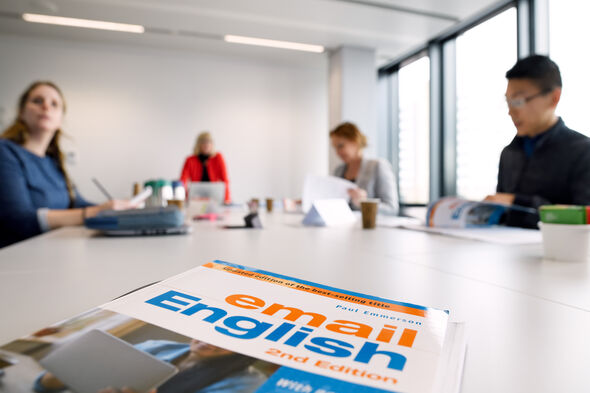
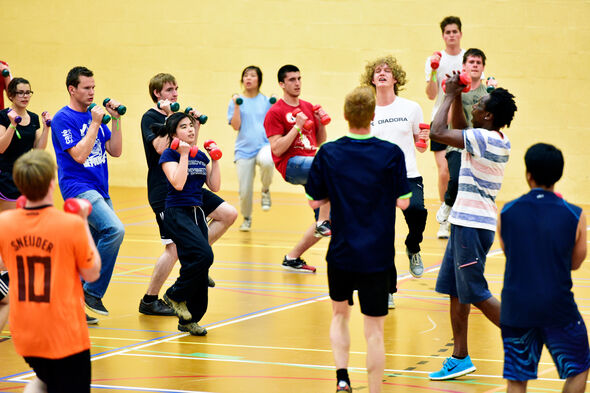
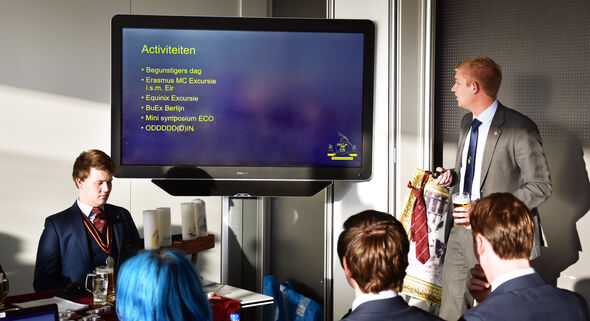
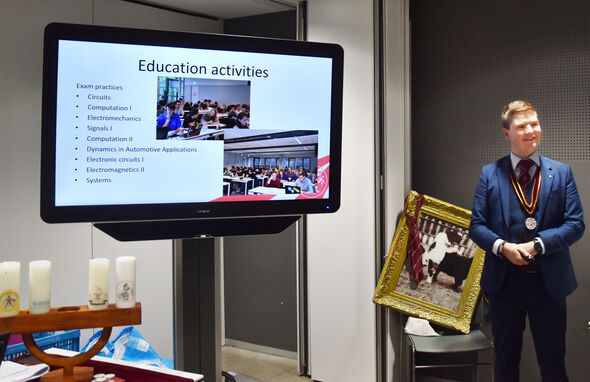
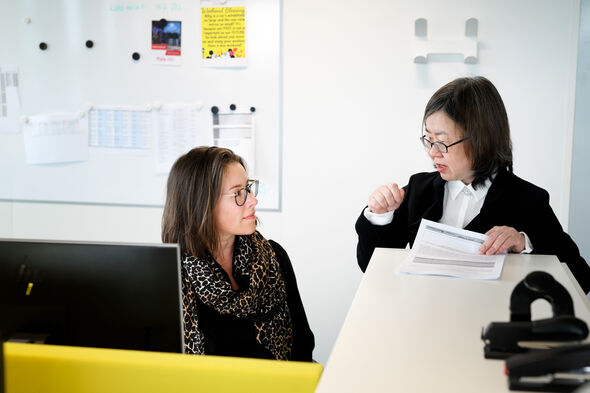
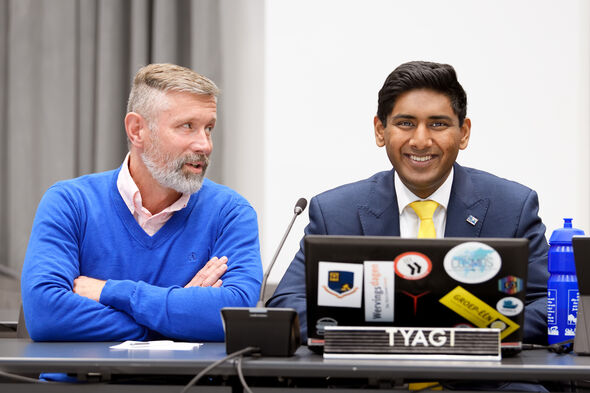
Discussion